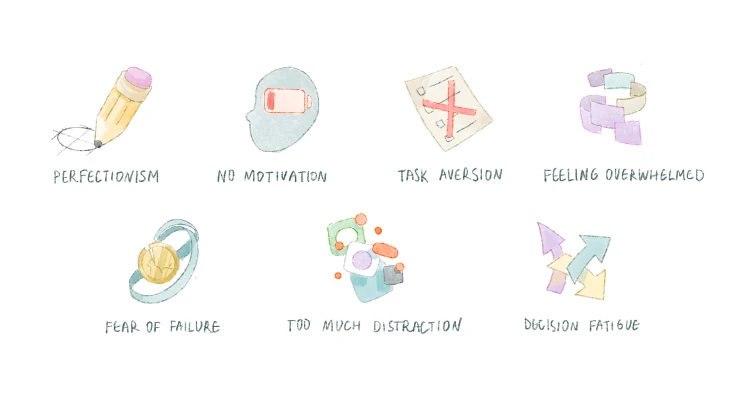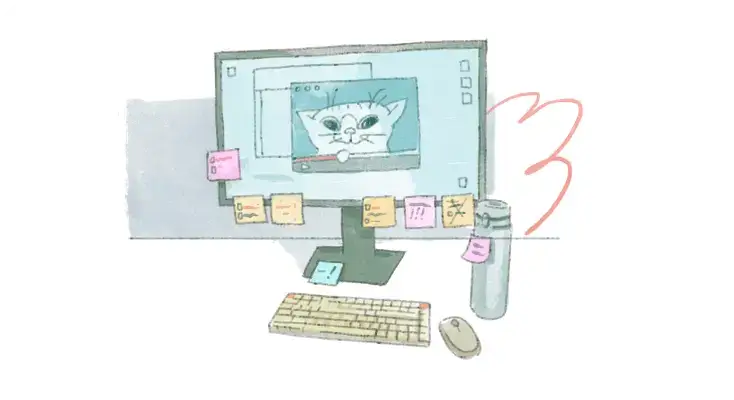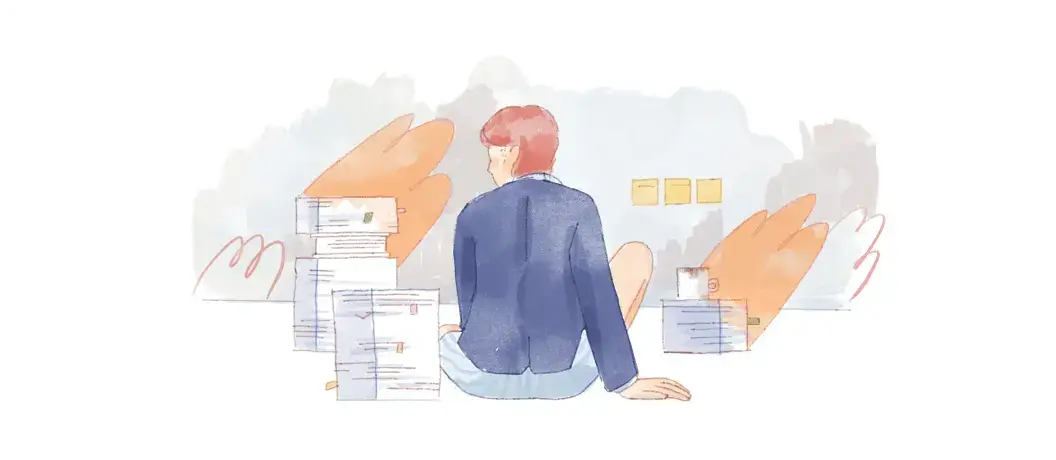“Procrastination” is derived from the Latin verb procrastinare, which means to postpone until tomorrow. This is true even in its etymology. Most people feel guilty about delaying tasks until the last minute, whether studying, doing chores, paying bills, or getting fit.
Asking yourself questions like, “Why do I procrastinate so much?” will not help you get anything done, but it will make you feel bad about yourself. What you need is help understanding procrastination, its causes, and how to overcome it.
What is procrastination?
The act of delaying something that needs to be completed is the definition of procrastination. Frequently, people who procrastinate may delay their priorities and instead concentrate on less critical, more pleasurable, and simple tasks.
Signs of procrastination often include difficulty setting priorities and succumbing to impulsivity, favoring immediate gratification over long-term goals. Procrastination usually arises from our struggle to manage internal emotions, leading us to seek external means of relief.
Dr. Tim Pychyl, a procrastination researcher, defines procrastination as a subconscious desire to feel good right now. His research found that the problem of procrastination is a problem of self-regulation. [1]
If you feel anxious, overwhelmed, confused, or frustrated by a task or fear that you may fail, you may turn to procrastination as a form of stress relief. Ultimately, individuals who procrastinate do not avoid tasks; rather, they avoid the negative emotions that are associated with specific tasks.
Other researchers echo this sentiment. According to Dr. Fuschia Sirois, procrastination often becomes a default coping mechanism for managing stress. Dr. Sirois views procrastination as a voluntary delay that individuals resort to despite understanding its detrimental effects, which can be debilitating. [1] She emphasizes that it’s more about struggling with mood management than simply managing time poorly.
Why do people procrastinate? 10 causes of procrastination
Understanding why do we procrastinate so much requires a profound exploration of our psychological and emotional landscapes, going beyond mere time management. It can be one of these reasons for procrastination, or even all of them together.

1. Lack of motivation
The most common reason for procrastinating your duties is that you just don’t want to do that. This may happen when you do not like the task or the people involved in it. There are other reasons why people have no motivation to do something: it is too complicated, frustrating, dull, or repetitive. All of this can cause us to postpone the task.
2. Fear of failure
Fear of failure is another incredible reason for procrastination. Simply put, procrastination may occur when one avoids or puts off doing a task because they are afraid they will fail at it. This mechanism acts as a barrier, preventing any potential failure. Although postponing the time of starting the task would guarantee its failure, most people choose to disregard this logic and put it off until later to avoid being embarrassed by imaginary failure.
3. You are stressed and fear the outcome
Also, your reasons for procrastination may be motivated by dread. For example, you might put off preparations for important exams because you are too worried about an important situation and its outcome. Anytime we feel worried about something too much, we tend to put it off until later.
4. You are perfectionist
Perfectionism is also contributing to why do we procrastinate. Perfectionism causes a person to want to complete every task perfectly, which impedes progress and leads to procrastination. [2] For example, you may postpone duties you are apprehensive about or believe you won’t do perfectly. Even though inspiration is more likely to strike once you begin a task, you may still attempt to delay it until you suddenly feel more inspired or have the “perfect idea.”
5. You found more pleasing distractions
Environmental distractions and stimuli may hinder our ability to concentrate on the task at hand. Many people like me would rather be on social media than do something they do not want to do, like paying bills, which is a complex task, and browsing your feed is not.
6. We’re not in touch with our future selves
People are much more focused on who they are and how they feel right now. This is called the “present bias.” We don’t think much about how our choices now will affect us in a few weeks or months, and we don’t care much about our future selves.
In 2019, fMRI scans of people’s brains were used to study this topic. [3] The results showed that different parts of the brain process information about our present and future selves. So, this study proves that we don’t see our future selves as extensions of who we are but rather as strangers.
7. Feeling overwhelmed
Procrastination is frequently attributed to feeling overwhelmed and uncertain about where to begin a task. This is often associated with the task appearing either too large or too abstract. In both instances, the unknown of how to initiate the process induces discomfort.
8. You have social anxiety
In certain instances, the discomfort associated with completing a task is not contextual; rather, social anxiety may play a role. Individuals who are afflicted with depression or generalized anxiety disorder may perceive even minor tasks as insurmountable. It is possible to delay the scheduling of meetings or the completion of projects due to the apprehension of being judged or humiliated. Consequently, procrastination serves as a defensive mechanism.
9. You have decision fatigue
The inability to think clearly and make sound decisions after engaging in lengthy decision-making processes is known as decision fatigue. And it’s what causes procrastination. For instance, if you are mentally fatigued and your brain overloaded, you may delay making difficult decisions or doing even simple tasks.
10. You have different dopamine regulation
Chronic procrastination is linked to dopamine, a neurotransmitter that makes you feel good and drives you. Neurobiologists say that people who put things off might have problems with how dopamine is controlled. [4] Until the task becomes urgent, it is hard for them to feel motivated. Read on to learn more about the science behind how our brains work when we put things off.
What happens in the brain when you procrastinate?
People can subconsciously react to stress in three ways: either they fight, flee, or freeze. Well, with all the modern stressors that you can’t physically fight or run away from, our brain opts to freeze.
In the brain, every day is a struggle between the limbic system (the evolutionarily old, primitive part of the brain involved in producing emotions) and the prefrontal cortex (the newer, rational part of the brain involved in decision-making). The limbic system is where your fight, flight or freeze reactions originate.
When the limbic system wins, it can lead to procrastination. The amygdala, a part of the limbic system, drives our subconscious reactions and emotional responses. When we experience stress, anxiety, fear, or threat, it can make us freeze.
In other words, we don’t act to perform the task. And the prefrontal cortex can’t rationally tell us, “No, don’t freeze—you can do this” because the limbic system takes over in highly stressful situations.
So what do you do while you’re frozen? You develop a habit because when you repeatedly procrastinate instead of completing tasks, the positive reinforcement of the avoidance behavior makes you feel safe and comfortable.
How does procrastination influence our lives? Social aspect
The pressure to be always productive, constant distractions, plus a lack of direction at work intensify the problem of why do people procrastinate. With jobs becoming less structured, workers are left to create order themselves and rely on self-management and self-regulation skills.
On top of that, they have to “slay all day.” This pressure, together with pervasive distractions, breeds procrastination. Dr. Steel also blames smartphones and social media for disrupting discipline and abusing the brain’s limbic system (but we know that a full fridge and dirty dishes can be just as distracting).
Why is procrastination bad? Some people seem to thrive on it and say they work best under pressure. Aside from the social repercussions of being late, fined, or being perceived as unreliable, procrastination takes a toll on your mental and physical health.
People who procrastinate have an increased risk of cardiovascular disease and hypertension, according to published research by Prof. Sirois [5]. This is partly due to the stress procrastinating can lead to in the long term and partly by delaying doctor visits, tests, and workouts.
The short-term relief of putting off unpleasant tasks quickly wears off, and in the end, feelings of guilt, shame, and self-directed anger arise. None of these emotions motivate people to take action, says Dr. Sirois. Studies found that they just give an extra level of negative emotions to the task, increasing the chances of procrastinating again.
Interesting Facts and Statistics About Procrastination
In recent years, researchers have hypothesized that procrastination has increased. Technology has been a contributing factor. In Dr. Steel’s book, The Procrastination Equation, he says that some people name procrastination as the defining feature of their personalities. In the 1970s, about 5% of people made this claim, and today, the number has risen to 20%.
A new white paper from 2022 by The Policy Institute, King’s College London, says that half of the people in the world often check their phones to procrastinate. According to more recent research, 75% of college students now consistently delay things. [6]
Interesting polls reveal statistics about procrastination in the USA [7]:
- Most Americans delay home tasks, exercise, and medical visits
- 2/5 of Americans feel they’d procrastinate less without social media
- Lack of motivation is the main reason Americans procrastinate
- Utah, Oklahoma, and Idaho residents procrastinate the most
As for the world statistics, it is known that Japanese students had the highest scores, followed by Taiwanese students, Hong Kong students, Americans, Australians, and New Zealanders.
How to overcome procrastination? 8 really effective tips
Now that you understand a little about the psychology of procrastination, what triggers it, and its consequences, you can learn how to break the habit. Here’s a guide on how to overcome procrastination based on the findings of prominent researchers.
1. Start by forgiving yourself
You developed the coping mechanism of procrastination for a reason. So ask yourself calmly and lovingly:
- Something must be seriously stressing me out. What is it?
- Why do I keep procrastinating?
- How am I feeling right now?
- What’s really stressing me out?
- What emotion am I avoiding and why?
In 2010, researchers found that students who could forgive themselves for procrastinating while preparing for their first exam demonstrated decreased procrastination in their following exams. [8]
They came to the conclusion that self-forgiveness helped people be more productive by letting them move past their maladaptive behavior and focus on the upcoming exam without the burden of past acts.
2. Find meaning in the task you’re avoiding
Look for ways to counter the negative emotions you feel regarding the task, and try to think of something positive about it. Answering these questions will give your task a purpose.
- What meaning does it have to you or others?
- Why is it important? What will you or others gain from it?
According to the reinforcement theory of motivation, a person is more likely to engage in a behavior when they know it brings them something positive. At work, for instance, this could involve a financial bonus, promotion, praise from the team, or feelings of fulfillment and purpose.
So, sometimes, a simple question like, “What would the future me want me to do right now?” can be surprisingly helpful.
3. Do the task you’re avoiding for just five minutes a day
Starting a task is the most dreaded part for a procrastinating person, but it’s also the most important one. So start with the smallest action, and you’ll see yourself going all the way.
Don’t overthink it. Overthinking lets you imagine you’re working on the task, which can intensify the negative emotions you’re trying to avoid. You’ll never start if you think a task will be taxing, dull, or time-consuming.
You can even set a timer—just five minutes. You may be surprised to find that you continue beyond that time. Sometimes, it’s just getting started that’s difficult.
4. Eliminate all sources of distraction
In a place with many distractions and stimuli, you will eventually lose your focus, which can lead to procrastination. A study from the University of California found that getting back on track takes 23 minutes and 15 seconds after being distracted.
So, a good practice will be to activate flight mode on your phone, turn off any devices that emit beeps, buzzes, or flashes, and close all superfluous tabs. Additionally, adjust a distracting environment: try not to work in loud spaces and use noise-canceling headphones.
5. Breakdown your task
As we already know, we can put things off when we think they will take too much time or effort. For that, you can split up big jobs into smaller steps that you can handle. This will help you focus on one step at a time by making the job seem less complicated. When you’re writing a study paper, for instance, divide it into smaller tasks like researching, making an outline, writing the first draft, and editing.

6. Block out time for specific tasks
Periodically, simple time management skills can help people stop putting things off. Setting aside time in your schedule for specific tasks may help you if you keep putting things off because you feel too busy or do not want to do them.
By blocking time, you can get rid of a lot of things that are stopping you from starting. First off, the uncertainty around when the task begins and finishes is gone. For example, you now have your report-writing time booked into your calendar between 12 and 2 p.m. Even just seeing it in a visual form gives you added accountability.
It also says to do one thing at a time instead of doing a bunch of things at once. Besides, it gives you a deadline, which, as studies have found, improves performance. [9]
7. If you feel stressed or anxious, try the 333 rule exercise
Sometimes, when we have a big deadline that we’ve procrastinated about for a little too long, we can start to panic. It’s very hard to get anything done while panicking, so your first step is to reduce the intensity of the anxiety in your body.
For that, try the 333 rule and other grounding techniques that will help you feel better at the moment. In a nutshell, you need to in situations of anxiety:
- Name 3 things you see
- Name 3 sounds you hear
- Move 3 body parts
The 333 method is a great way to ground yourself and shift your attention from your thoughts to the present moment.
8. Make it fun
Set a reward for yourself that you will give yourself when the task is finished. This is another way to keep yourself going. For instance, what can you do to reward yourself when you are done? Researchers have found that the brain responds to things that give us pleasure. This can help us form habits and overcome procrastination. [10]
FAQ
1. Is procrastination a sign of depression?
Procrastination can be a sign of depression. However, the fact that you put off doing something that needs to be done does not mean you have this mental health condition.
We recommend contacting a mental health professional in case you feel that your procrastination is severely influencing and hindering your daily life.
2. Why is procrastination bad?
It can help in the short term to avoid negative feelings towards tasks. However, in the long term, procrastination can also become a habit and create a self-defeating cycle. A 2023 study demonstrated that the links between chronic procrastination and poor health are accounted for mainly by higher stress. [11]
3. Is procrastination a mental illness?
Procrastination isn’t considered a mental illness among professionals. Nevertheless, procrastination may be a symptom of mental disorders, including anxiety disorders, OCD, ADHD, or eating disorders.
Sources:
- Sirois, F. and Pychyl, T. (2013) Procrastination and the Priority of Short-Term Mood Regulation: Consequences for Future Self. Social and Personality Psychology Compass.
- Yan B, Zhang X. What Research Has Been Conducted on Procrastination? Evidence From a Systematical Bibliometric Analysis. Front Psychol. 2022
- Duckworth, A. L., Milkman, K. L., & Laibson, D. (2018). Beyond Willpower: Strategies for Reducing Failures of Self-Control. Psychological Science in the Public Interest.
- Bromberg-Martin ES, Matsumoto M, Hikosaka O. Dopamine in motivational control: rewarding, aversive, and alerting. Neuron, 2010.
- Sirois, F.M (2015) Is procrastination a vulnerability factor for hypertension and cardiovascular disease? Testing an extension of the procrastination–health model. Journal of Behavioral Medicine.
- R. Alexander, F. Davis, H. Ayah, Klingsieck Katrin B. Procrastination Among University Students, Frontiers in Psychology, 2022
- The States with the Worst Procrastinators, Statistic 2024.
- Michael J.A. Wohl, Timothy A. Pychyl, Shannon H. Bennett, I forgive myself, now I can study.
- Ariely, D., & Wertenbroch, K. (2002). Procrastination, Deadlines, and Performance: Self-Control by Precommitment. Psychological Science, 13(3), 219-224.
- Dolan RJ, Dayan P. Goals and habits in the brain. Neuron. 2013
- Sirois, Fuschia & Stride, Chris & Pychyl, Timothy. (2023). Procrastination and health: A longitudinal test of the roles of stress and health behaviours. British journal of health
Disclaimer
This article is for general informative and self-discovery purposes only. It should not replace expert guidance from professionals.
Any action you take in response to the information in this article, whether directly or indirectly, is solely your responsibility and is done at your own risk. Breeze content team and its mental health experts disclaim any liability, loss, or risk, personal, professional, or otherwise, which may result from the use and/or application of any content.
Always consult your doctor or other certified health practitioner with any medical questions or concerns
Breeze articles exclusively cite trusted sources, such as academic research institutions and medical associations, including research and studies from PubMed, ResearchGate, or similar databases. Examine our subject-matter editors and editorial process to see how we verify facts and maintain the accuracy, reliability, and trustworthiness of our material.
Was this article helpful?



